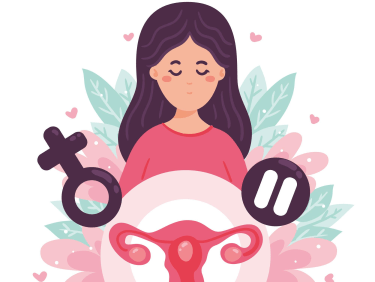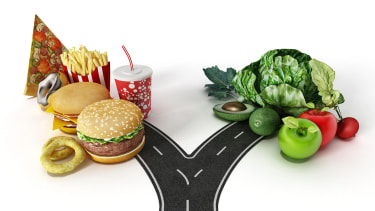A South Jersey Woman’s Guide to
Sustainable Weight Loss After 40

It often starts quietly. A pair of favorite jeans that suddenly feel a bit too snug. The afternoon energy slump that coffee can’t seem to fix. The number on the scale that remains stubbornly frozen, despite your best efforts with salads and workouts. If you're a woman over 40 here in South Jersey, this story is likely familiar. It’s a frustrating cycle that can leave you feeling like you’re doing something wrong.
Let us be clear: This isn't a failure of discipline. Your body’s fundamental biology is shifting. Losing weight in your 40s, 50s, and beyond isn’t about trying harder; it’s about working smarter. It’s about understanding the profound biological shifts happening within you and adopting a new strategy that works with your body, not against it.
This guide is for you: The woman in Gloucester County juggling a career and family, the woman in Camden County looking to reclaim her energy, and every woman across Salem and Atlantic counties who is ready for a sustainable, healthy change.
Here at Mullica Hill Medical & Wellness, we’ve guided countless women from across our South Jersey community through this journey. We understand the unique challenges you face, and we’re here to show you that not only is it possible to achieve a healthy weight after 40, but it’s also an opportunity to build a stronger, more vibrant version of yourself.
Why Does Losing Weight Feel So Different After 40?
If you feel like your body has betrayed you, you’re not imagining things. The transition through perimenopause and menopause brings a cascade of changes that fundamentally alter your metabolism and how your body stores fat. It’s a complex biological process, but understanding it is the first step toward taking back control.
Understanding the Metabolic Shift
One of the biggest culprits behind the slowdown is a natural process called sarcopenia, which is the age-related loss of muscle mass. Starting in our 30s, we can lose 3-5% of our muscle mass per decade if we’re not actively working to maintain it. Muscle is your body’s metabolic engine; it burns more calories at rest than fat does. As you lose muscle, your Basal Metabolic Rate (BMR), the number of calories your body burns just to stay alive, naturally declines. This means that even if you’re eating the same amount you did in your 30s, you’re more likely to gain weight because your body simply doesn’t require as much energy. It’s a quiet, gradual change, but its impact is significant.
The Role of Hormonal Changes
The insights from recent research are clear: hormonal fluctuations are a primary driver of weight management challenges for women over 40. This isn't just about hot flashes or mood swings; it's about a complete rewiring of your body's chemistry.

Declining Estrogen
Estrogen plays a critical role in regulating metabolism and body fat distribution. As estrogen levels drop during perimenopause and menopause, your body’s ability to manage blood sugar can change. More importantly, this hormonal shift encourages fat to be stored centrally, around the abdomen. This isn't just a cosmetic concern; this type of visceral fat, which surrounds your internal organs, is metabolically active and linked to a higher risk of insulin resistance, type 2 diabetes, and cardiovascular disease. So, that stubborn "belly fat" you’re noticing is a direct physiological response to these hormonal changes.

Increased Cortisol
Cortisol, often called the "stress hormone," tends to rise as estrogen and progesterone decline. Chronic stress, which is all too common for busy women in South Jersey, keeps cortisol levels elevated. High cortisol is directly linked to increased appetite, cravings for high-fat and high-sugar foods, and, you guessed it: even more fat storage in the abdominal area! It creates a vicious cycle where stress contributes to weight gain, and the frustration of that weight gain causes more stress.

Changes in Insulin Sensitivity
As hormones fluctuate, your body’s cells can become less responsive to insulin, a condition known as insulin resistance. This means your body needs to produce more insulin to manage blood sugar, and high insulin levels are a powerful signal for your body to store fat rather than burn it. This is why many women find that diets high in refined carbohydrates and sugars, which might have been manageable before, now lead to rapid weight gain.
What's the Best Way to Eat for Weight Loss in Your 40s and Beyond?
The answer is not another restrictive, punishing diet. The fad diets that promise rapid weight loss often rely on extreme calorie deficits, which can actually damage your metabolism further by signaling to your body that it’s in a state of starvation, causing it to hold onto fat even more tightly. For sustainable, healthy weight loss for women over 40, the focus must shift from restriction to nourishment.
Ditching Fad Diets for Sustainable Nutrition
The key is to create a lifestyle of eating, not a temporary diet plan. Your body needs a steady supply of high-quality nutrients to navigate hormonal changes and support a healthy metabolism. Starving it of calories or entire food groups is counterproductive. Instead of asking, "What can I cut out?" start asking, "What powerful nutrients can I add in?" This simple shift in mindset can transform your relationship with food from one of conflict to one of partnership.
Building Your Plate - The Core Components
To combat muscle loss and keep your metabolism humming, your plate should be built around a few key components at every meal:
- Lean Protein: Protein is your absolute best friend in this journey. It’s essential for building and maintaining that precious, calorie-burning muscle mass. It also has a high thermic effect, meaning your body burns more calories digesting it, and it is incredibly satiating, keeping you feeling full and satisfied for longer. Aim for sources like chicken breast, fish, lean turkey, eggs, Greek yogurt, tofu, and legumes.
- High-Fiber Carbohydrates: Forget the idea that all carbs are bad. Your body needs carbohydrates for energy, but the type matters. Focus on high-fiber options like vegetables (leafy greens, broccoli, peppers), fruits (berries, apples), and whole grains (quinoa, oats, brown rice). Fiber slows down digestion, helps stabilize blood sugar levels, prevents insulin spikes, and feeds the healthy bacteria in your gut.
- Healthy Fats: Healthy fats are crucial for hormone production and managing inflammation. They also contribute to feeling full and satisfied. Don't be afraid of fats from sources like avocado, olive oil, nuts, and seeds. They are a vital part of a balanced diet for women over 40.
Creating a Realistic Weight Loss Meal Plan
What does this look like in practice? It’s simpler than you think. Here is a sample day to give you an idea of a balanced template:
- Breakfast: A scramble of two eggs with spinach and a side of half an avocado. This provides a strong start with protein and healthy fats to keep you full until lunch.
- Lunch: A large salad with grilled chicken breast, a variety of colorful vegetables, chickpeas, and a light vinaigrette made with olive oil.
- Snack: A cup of Greek yogurt with a handful of berries and a few almonds.
- Dinner: Baked salmon (rich in omega-3s) with a side of roasted broccoli and a small serving of quinoa.
This is just a template. The goal is to ensure every meal is balanced with protein, fiber, and healthy fats, creating a sustainable and enjoyable eating pattern.
For more diet-related guidance, check out - A Doctor's Guide to the Best Diets for Women Over 40 in Mullica Hill.
Finding Fresh, Healthy Foods Near Mullica Hill
One of the best things about living in South Jersey is our access to fresh food. While the Mullica Hill Amish Market is a fantastic resource, great options exist across our entire area. From the famous Collingswood Farmers Market in Camden County to the various farm stands in Salem and Atlantic counties, choosing local produce is a simple way to boost your meals and support our community.

How Lifestyle Factors in South Jersey Play a Part
Your biology is only part of the story. Life in your 40s and 50s here is busy. Whether you're commuting on Route 55, managing a household in Cherry Hill (Camden County), running a business in Salem County, or navigating the Expressway for work in Atlantic County, stress is often a constant companion. This chronic stress keeps cortisol levels high, working against your weight loss efforts. Furthermore, hormonal changes can disrupt sleep patterns, leading to fatigue. Poor sleep, in turn, disrupts appetite-regulating hormones like ghrelin (the "hunger" hormone) and leptin (the "fullness" hormone), making you feel hungrier and less satisfied after eating. It’s a perfect storm of biological and lifestyle factors that makes losing weight feel like an uphill battle.
What Exercises Actually Work for Burning Fat After 40?
Just as your nutritional needs change, your approach to exercise needs to evolve, too. The long, grueling cardio sessions you might have relied on in your 20s are not the most effective strategy now. The goal is to build your metabolic engine and manage stress, not to exhaust yourself.

The Power of Strength Training
If you do only one type of exercise, make it strength training. This is non-negotiable for women over 40. Building and maintaining lean muscle is the single most effective way to counteract a slowing metabolism. The more muscle you have, the more calories your body burns around the clock, even when you’re resting. You don’t need to become a bodybuilder. Consistency is what matters.
Start with simple bodyweight exercises at home, such as:
- Squats
- Lunges
- Push-ups (on your knees is a great start)
- Planks
- Glute bridges
Aim for two to three 30-minute sessions per week. As you get stronger, you can incorporate resistance bands or light dumbbells.
Rethinking Cardio for Better Results
This doesn’t mean you should give up on cardio entirely. Cardiovascular exercise is vital for heart health, but the type and intensity are key. High-intensity, high-impact workouts can sometimes increase cortisol levels, which can be counterproductive for fat loss in women over 40.
Instead, focus on moderate-intensity cardio that gets your heart rate up without leaving you feeling completely drained. Activities like brisk walking, cycling, swimming, or using an elliptical machine are fantastic options. They burn calories, improve cardiovascular health, and can be great for mental clarity without putting excess stress on your body.
Great Places for a Walk or Run in Southern New Jersey
We are fortunate to have beautiful outdoor spaces right in our backyards. Turning exercise into an enjoyable activity is key to sticking with it. Instead of staying indoors, try taking a brisk walk at a local spot that’s convenient for you:
- In Gloucester County, the scenic trails at Washington Lake Park or Chestnut Branch Park are local favorites.For those in Camden County, the well-maintained paths at Cooper River Park offer beautiful waterfront views.
- In Atlantic County, you can’t beat the fresh air on the boardwalks in Ventnor or Margate, or the natural beauty of Estell Manor Park.
And in Salem County, the serene environment of Parvin State Park provides a perfect escape.
The Importance of Flexibility and Stress Reduction
Finally, don’t neglect activities that calm your nervous system. Practices like yoga and daily stretching not only improve flexibility and prevent injury but are also powerful tools for lowering cortisol levels. Taking just 10-15 minutes a day to stretch and breathe deeply can have a profound impact on both your mental well-being and your body’s ability to release stubborn weight.


Why Should You Consider a Medically Supervised Weight Loss Program?
You now have a solid understanding of the science, nutrition, and exercise principles for weight loss after 40. You could take this information and try to create a plan on your own. But if you’re tired of the guesswork, feeling overwhelmed, or have struggled to see results in the past, there is a safer, more effective path forward.
The Problem With a One-Size-Fits-All Approach
The internet is flooded with weight loss plans, diet books, and fitness apps. The problem is that none of them are designed for you. They don’t know your medical history, your specific hormonal profile, your lifestyle demands, or your unique metabolic rate. A generic plan is a shot in the dark, and for women over 40, whose bodies have a complex interplay of factors, this approach often leads to frustration and failure. It’s why so many women feel like they’re doing everything right but still can’t lose weight.
The Mullica Hill Medical & Wellness Difference
This is where a medically supervised weight loss program changes everything. It’s not a diet; it’s a clinical approach to your health. At Mullica Hill Medical, our Weight Loss programs are designed and overseen by doctors who understand the intricate physiology of a woman’s body after 40. This is our unique advantage, and it’s what ensures your journey is both safe and successful.
A medically supervised program takes the guesswork out of the equation. We start with a comprehensive evaluation of your health, including a review of your medical history and an understanding of your lifestyle. We don’t hand you a generic meal plan. We create a personalized strategy tailored to your unique needs, ensuring you’re losing weight in a way that supports your overall health, not compromises it.
What Does a Medically Supervised Program Involve?
Our process is built on partnership and support:
- Comprehensive Consultation: It all starts with a conversation. We listen to your challenges, your goals, and your history. We conduct a health assessment to get a clear picture of your unique biological landscape.
- Personalized Plan: Based on this assessment, our medical team designs a plan that is uniquely yours. This always includes foundational nutritional guidance and realistic exercise recommendations. However, our clinical advantage means we can also integrate advanced medical support where it’s needed. This may include balancing hormones with BHRT for Menopause to address the root causes of menopausal weight gain, or incorporating other proven medical weight loss programs when appropriate. The goal is a truly holistic plan that addresses your health from every angle.
- Ongoing Support and Adjustments: This isn’t a "set it and forget it" program. We are with you every step of the way. Through regular check-ins, we monitor your progress, make adjustments as needed, and provide the professional guidance and encouragement you need to stay on track. We celebrate your successes and help you navigate any hurdles.
This approach ensures you’re not just losing pounds, but building sustainable, healthy habits that will last a lifetime.
Losing weight after 40 can feel like a lonely and confusing journey, but it doesn’t have to be. Your body has changed, and your strategy needs to change with it. It’s time to let go of the old rules that no longer serve you and embrace a smarter, more compassionate approach. By focusing on nourishing your body with the right foods, building strength through effective exercise, and managing stress, you can absolutely achieve your weight loss goals.
Most importantly, remember that you don’t have to figure it all out on your own. Having an expert, medically-guided team in your corner can make all the difference, providing the safe, personalized plan and unwavering support you need to finally succeed.
Conveniently located in Mullica Hill, we are proud to serve as a health partner for women throughout Gloucester, Camden, Salem, and Atlantic counties.
Ready to stop the guesswork and start a weight loss plan that truly works for you? Book a consultation with our expert team at Mullica Hill Medical & Wellness today and take the first step toward a healthier, more vibrant you.
Frequently Asked Questions About Weight Loss After 40
What foods should women over 40 avoid?
Instead of thinking of foods as "off-limits," it's more helpful to focus on limiting items that can worsen hormonal symptoms and inflammation. These include highly processed foods, sugary drinks and snacks, refined carbohydrates (like white bread and pastries), and excessive alcohol. These can disrupt blood sugar, interfere with sleep, and contribute to weight gain.
How can I boost my metabolism after 40?
The single most effective way is to build and maintain lean muscle through strength training. Other powerful strategies include eating enough protein at every meal, staying well-hydrated, getting adequate sleep, and managing stress. While there's no "magic pill," these combined habits create a strong foundation for a healthier metabolism.
What is the quickest way to lose belly fat after 40?
The desire for a quick fix is understandable, but sustainable fat loss is key. Belly fat in this age group is largely hormonal, so a holistic approach works best. This includes a nutrient-dense diet rich in protein and fiber, consistent strength training to build muscle, managing cortisol through stress-reduction techniques like walking or yoga, and prioritizing sleep. You can't spot-reduce fat, but a comprehensive lifestyle change will reduce visceral belly fat over time.